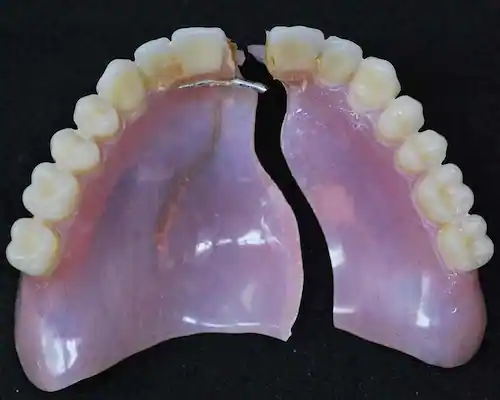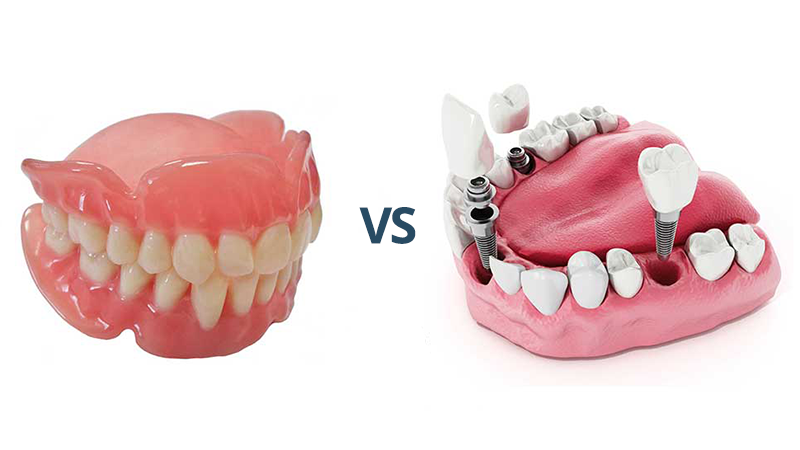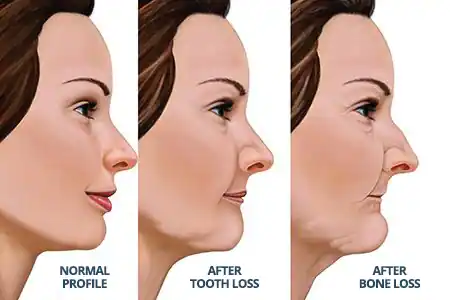Are you searching for the optimal solution to address missing teeth? Explore the fascinating distinctions between dental implants and dentures, which encompass factors such as convenience, durability, comfort, aesthetics, jawbone health, and expenses. Determine which alternative aligns with your particular needs and preferences.
Are you fed up with the inconvenience caused by dentures? Perhaps they no longer fit snugly or display signs of wear and tear. Whatever your reason for contemplating a transition to dental implants, you’re not alone. Many denture wearers are curious about the advantages of dental implants and when it’s appropriate to switch.
So, when is the optimal moment to exchange dentures for dental implants? Multiple factors must be evaluated, such as the age of your dentures, level of comfort, condition of the dentures, concerns about facial aging, ease of use, and others. Let’s delve deeper into all these considerations to assist you in determining whether dental implants are the appropriate choice for you.
#1: Convenience
Do you find it exhausting to remove your dentures for cleaning or feel uneasy about them slipping out while eating or speaking? Dental implants provide a lasting and trouble-free remedy for missing teeth. Dental implants eliminate the need to remove them for cleaning or worrying about them shifting.
If you’re tired of dealing with the inconvenience caused by dentures, it may be time to contemplate dental implants. Dental implants provide a durable solution to missing teeth, delivering a comfortable and natural-looking smile that can endure for a lifetime with proper maintenance. If you’re curious about whether dental implants are the right alternative for you, take our complimentary online quiz to determine if you are a suitable candidate for dental implants.
#2: Worries regarding facial aging and shrinking of the jawbone
Were you aware that the loss of teeth can impact the look of your face? When teeth are missing, the jawbone can weaken, resulting in a sunken or aged facial appearance. Dental implants offer the necessary stimulation to the jawbone to sustain its strength and structure, which can enhance your facial appearance and make you appear younger and livelier.
When a tooth is lost, the bone that supported the tooth can begin to deteriorate over time. This process is known as bone resorption and can cause a variety of oral health problems, including a sunken facial appearance, gum recession, and difficulties with eating and speaking.
Dental implants are designed to mimic the structure of a natural tooth, with a titanium post that is inserted into the jawbone. Over time, the post fuses with the surrounding bone tissue in a process known as osseointegration. This process helps to stimulate the bone tissue and prevent bone resorption from occurring.
#3: Deterioration of the dentures
Is the wear and tear on your dentures becoming noticeable? If your dentures are chipped, cracked, or broken, it might be time to think about dental implants. Unlike dentures, which can be challenging and costly to fix, dental implants are intended to be a permanent solution that can last a lifetime with proper maintenance. By swapping your damaged dentures for dental implants, you can relish a genuine-looking smile that is not only convenient but also free from the expenses of continual repairs.

#4: Comfort
Are your dentures causing discomfort? If you are experiencing pain or discomfort while wearing your dentures, it might be time to think about dental implants. Unlike dentures, which rest on top of your gums, dental implants are securely attached to your jawbone, providing a more stable and comfortable fit. This means you can say goodbye to the worry of your dentures slipping or causing sore spots in your mouth.
#5: The age of your dentures
When determining whether to opt for dental implants, the age of your dentures plays a crucial role. Over time, dentures can wear out and no longer fit as snugly. If your dentures are over five years old, upgrading to dental implants may be worthwhile. Dental implants offer a permanent solution for missing teeth and, with appropriate maintenance, can last a lifetime. If you’re weary of the inconvenience and cost of regularly replacing your dentures every few years, dental implants may prove to be a more economical option in the long term.
#6: Aesthetics
Dental implants are designed to look and feel like natural teeth, giving you a natural-looking smile and improved self-confidence.
Unlike dentures, which can shift, slip or cause irritation, dental implants offer a stable and natural-looking replacement for missing teeth. They’re designed to mimic the look, feel and function of natural teeth, providing a seamless and attractive result.
Another advantage of dental implants in terms of aesthetics is their versatility. They can be customized to match the color, size, and shape of your remaining teeth, creating a harmonious and balanced smile. This means that dental implants can blend in with your natural teeth, making them virtually indistinguishable from your real teeth.
#7: Functionality
Dental implants are anchored into your jawbone, which provides a secure and stable base for your replacement teeth. This means that you can eat your favorite foods without worrying about your teeth slipping or coming loose, which is a common problem with dentures. With dental implants, you can enjoy a wider variety of foods and maintain a healthy and balanced diet.
Dental implants also allow you to speak with greater ease and clarity. Missing teeth can affect your ability to pronounce certain words, which can lead to communication difficulties and social embarrassment. Dental implants provide a stable and natural-looking replacement for missing teeth, which can help you to speak with greater confidence and clarity.
Another advantage of dental implants in terms of functionality is that they require no special care. Unlike dentures, which need to be removed and cleaned regularly, dental implants can be cared for like natural teeth. This means that you can brush, floss, and visit your dentist for regular checkups, just like you would with your natural teeth.
#8: Longevity
Dental implants can last a lifetime with proper care, while dentures may need to be replaced every few years.
Unlike dentures, which can wear out and require frequent replacements, dental implants are designed to be durable and resistant to wear and tear. They are made from high-quality materials such as titanium, which is biocompatible and able to fuse with your jawbone over time. This means that dental implants can provide a permanent replacement for missing teeth, eliminating the need for frequent replacements.
Another advantage of the longevity of dental implants is that they can save you money in the long run. While dental implants can be more expensive initially than dentures, they can actually be more cost-effective over time. Dentures require regular maintenance, repairs, and replacements, which can add up in terms of cost. Dental implants, on the other hand, only require regular check-ups and routine care, which can save you money in the long run.
#9: Risk of complications
Dental implants have a lower risk of complications than dentures, which can cause sore spots, gum irritation, and other issues. However, dental implants do carry some risk of infection or implant failure.
It’s important to keep in mind that while these risks do exist, they are relatively rare. Most people who undergo dental implant surgery experience a smooth and successful recovery. However, it’s important to discuss these risks with your dentist or oral surgeon before undergoing any dental implant surgery, so you can make an informed decision about which option is best for you.





